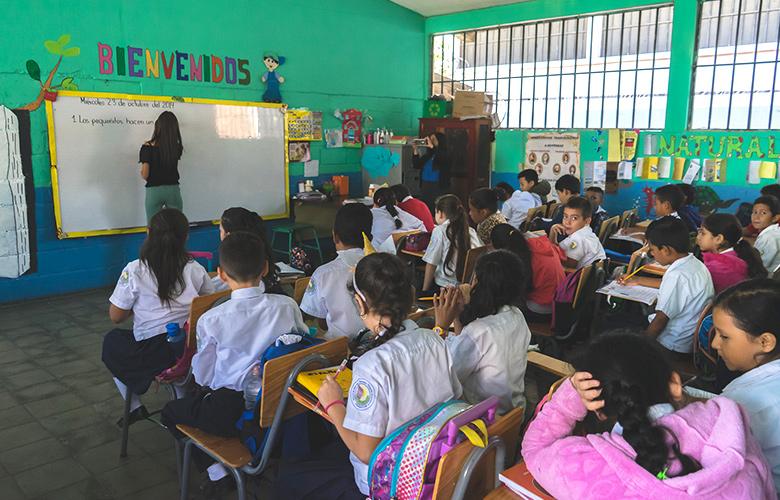
In October 2019, EDC President Dave Offensend and Charter Trustee Bill MacArthur visited two USAID-funded programs being implemented by EDC in Honduras, including De Lectores a Líderes.
We drive past a police checkpoint into a gang-controlled neighborhood of Tegucigalpa, Honduras. Following accepted security protocol, our windows are down so gang lookouts can see from our tan vests that we are part of De Lectores a Líderes (“from Readers to Leaders”), a program to improve reading and literacy in Honduras. Our destination is an elementary school that has been using the new reading curriculum for two years now.
At the school, we sit in on a second-grade classroom where we observe the teacher working with her class of 30 students on new vocabulary words. All the children seem engaged (at least when not gawking at their visitors) and capable of using the new words in sentences—quite good for second-graders. Later we meet with the principal of the school who presents meticulous data indicating that virtually all the students are reading at grade level by the end of the school year. We also converse with some parents who share how pleased they are with the program. Both the principal and the parents explain how the positive results not only produce good readers. School success incents other parents to keep their children in school, thereby contributing to a strong community. The pride that comes through in their speech is palpable.
Funded by the U.S. Agency for International Development and implemented by EDC, De Lectores is quite an ambitious undertaking. The goal is to transform reading and writing for 700,000 students in Honduras, or about half the elementary school population. Reaching this goal has meant developing all new textbooks, teacher guides, and supplementary reading material, as well as training about 15,000 teachers throughout the 2,500 schools. It has involved an outreach program to get more parents involved, both in supporting the school program and in reading with their children at home. And it has meant building many more school libraries so the children have access to books for recreational reading.
While it is easy to measure reading fluency and comprehension in the classroom, it is impossible to quantify all the powerful impacts of this program.
How do you measure the benefit of developing a nation of happy readers?
Dave Offensend is EDC’s president and CEO.
Add new comment